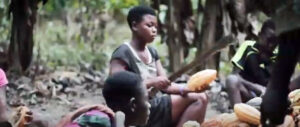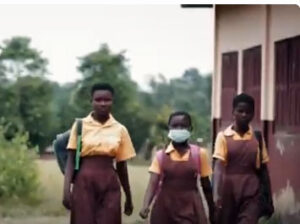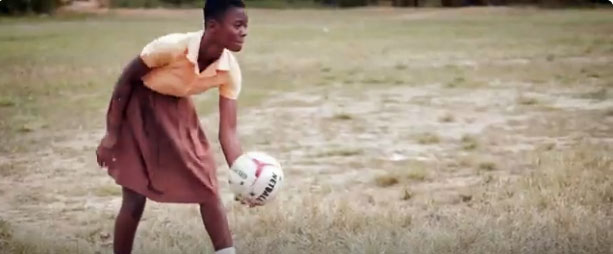A recent study by NORC at the University of Chicago found that child labor in Ghana and Ivory Coast cocoa production increased 14 percent in less than a decade, demonstrating the urgent need for more effective and inclusive interventions, says the General Agricultural Workers’ Union of Ghana (GAWU). GAWU is reducing child labor in cocoa farming communities by applying a child-labor-reduction model honed in fishing communities on Lake Volta that raises awareness and incomes of parents so kids can stay in school.
“Where the union is present, child labor is absent,” says GAWU Deputy General Secretary Andrews Addoquaye Tagoe about a new video produced with Solidarity Center support. He points to the successful long-term GAWU child labor interventions in fishing communities in Kpando Torkor and, more recently, child labor reduction programs in cocoa farming communities, for which GAWU received an international labor rights defender award this year.

Girl opening a cocoa pod with a sharp machete in a GAWU child labor video
Up to 2 million children are engaged in cocoa production in West Africa, primarily in Ghana and Ivory Coast. The two countries together supply about 70 percent of the world’s cocoa beans. As cocoa production in both countries has increased—by 62 percent during the past decade—so has child labor. In Ghana, 55 percent of children living in agricultural households are reportedly engaged in child labor, more than 90 percent of them engaged in at least one form of hazardous child labor.
Using the collective power of farmers and their families, communities, anti-child labor clubs, school authorities and local leaders to fight child labor in more than 180 cocoa farming communities in the Ashanti, former Brong-Ahafo, Central, Eastern, Volta and Western, regions, GAWU’s 30,000 cocoa farmer members are:
- Building worker voice at the local and national levels for farmers to benefit from higher cocoa prices and the profitable global chocolate industry
- Negotiating collective bargaining agreements with Ghana’s Cocoa Board that establish binding commitments to producing child-labor free cocoa
- Creating child-free labor zones and Community Child Protection Committees who enforce child labor legislation
- Working through cocoa farmer cooperatives to produce cocoa byproducts and developing skills for non-farm economic activities to generate income that covers children’s school-related expenses
- Supporting and sending children to bridge schools that provide academic support to children withdrawn from child labor and prepare them to reintegrate into mainstream schools

Girls in Torkor village walking to school in a GAWU child labor video
The union’s child labor reduction Torkor model is finding success, says Tagoe, because it represents the multiple intervention and community-based approaches that the NORC report findings say are key. The $103 billion cocoa industry’s current approach—which includes the expenditure of $215 million on voluntary certification programs during the past decade even as child labor prevalence continued to rise—represents the industry’s failure to fulfill its longstanding promise to eradicate child labor from its supply chains.
Unions are at the heart of sustainable, effective interventions because they engage community leaders, including women and youth, in their design and implementation, as recommended by NORC and the Child Labor Coalition. “We are driven to step up our organizing efforts and help new and current members work with community partners to fight child labor in cocoa,” says Tagoe. “Agriculture without child labor is possible.”
According to the Child Labor Coalition, of which the Solidarity Center is a member, “The industry needs to focus on paying a living income while also rapidly scaling up programs that identify child laborers and ensure that children are able to go to school.”
GAWU is the largest trade union representing formal- and informal-sector farmers and agricultural workers in Ghana, and an affiliate of Solidarity Center partner Trades Union Congress-Ghana (TUC-Ghana) and the International Union of Food, Hotel, Tobacco, Restaurant and Allied Workers (IUF).
Watch the video:

